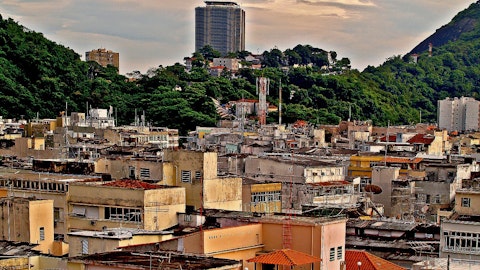In this article, we will be taking a look at the 15 most technologically advanced countries in Africa. To skip our detailed analysis, you can go directly to see the 5 most technologically advanced countries in Africa.
Africa is one of the worst off regions in the entire world, and dominates the list of poorest countries in the world. There have been many reasons behind this lack of advancement even in a consistently evolving world, with contributors including lack of long-term policies, corruption, civil war and even terrorism in many countries. However, the technology industry provides a golden opportunity for Africa to transform its fortunes, and the most technologically advanced countries in Africa need to lead this potential revolution.
It would probably not be an exaggeration to state that the tech industry right now is as important as the Industrial Revolution that allowed the U.S. and Europe to become developed economies enjoying a higher standard of living. The exponential growth and opportunity in the tech industry is continuing to not just be one of the biggest contributors to the global economy but is also important in advancing human evolution, with projects changing every faucet of our lives, from food production which you can learn more about in the top meat producing countries in the world, to payment methods through the rise of fintech and of course, goods production.

A technician working with a control panel in a gas distribution center. Editorial photo for a financial news article. 8k. –ar 16:9
The most technologically advanced countries in Africa will have to play a significant role in this area, even as areas in the region have been considered to be the next “Silicon Valley”, and in the 2022 Technology Pioneers list, the World Economic Forum called out 6 African companies, including Access Afya in Kenya, a healthcare company and Amperswand based in Rwanda, a company operating in the battery-swap energy business for light vehicles. Meanwhile, Flutterwave is a Nigerian company specializing in fintech and payment solutions, and claims to connect over 1 billion Africans to the global economy.
The success of these companies and the amazing potential that the tech leading countries in Africa have presented has led to a major increase in investment, and according to the African Private Capital Activity Report, fundraising jumped to $4.4 billion in 2021, a massive increase of average fundraising per year of just $2.7 billion from 2016 to 2020. Close to 700 equity rounds were raised by 640 startups, though there is still a lot of disproportionality in where the funds are going as currently, West Africa dominates VC funding. Even in 2022, when an economic downturn was being faced, and inflation was rampant in most regions including Africa, the region’s venture capital investment still remained particularly high and close to 500 deals were closed in just the first half of 2022, raising more than $3.5, and shattering even 2021 numbers.
While they’re not close to being as dominant in space as the U.S., China, Russia or even India now, various African countries boast space agencies. Nigeria, which surprisingly failed to make our list of the most tech advanced countries in Africa, is also home to a space agency which is valued at around $1 billion. While Nigeria’s space agency has already developed critical mass and is working to democratize space tech, it is still in need of funds, something which we’ll discuss when talking about the issues faced by the tech sector in Africa.
As always, there are challenges for any industry really, and considering the issues plaguing Africa’s potential for decades, such challenges are more pronounced in the region. Among the issues that the most tech advanced nations in Africa will have to overcome are the lack of access to talent and capital. Despite the aforementioned record increase in VC funding, an estimate suggests that nearly three-quarters of African startups do not have access to the requisite talent and capital needed to ensure consistent growth, while gender inequality is also stopping Africa from realizing its full potential as only 27% of startups in the region were female led in H1 2022.
One of the most important ways to ensure consistent growth for startups and foster an environment to improve the probability of success is to have startup accelerators. Unfortunately, in Africa, only 6% of current activity is coming through accelerators and business incubators, showcasing a significant gap with potentially major repercussions. One way to get around this limitation is to work with or be purchased by larger companies whose business needs align with the service the startup delivers, and considering there are over 400 companies in Africa with more than $1 billion in annual revenue, this presents a promising opportunity. While there are many promising tech companies in Africa, one of the most lauded ones right now is Flutterwave, a Nigerian fintech company which has been said to be valued at $3 billion. Even this valuation was on the basis of a series D round in 2022 when Flutterwave raised more than $250 million and saw its valuation being tripled.
U.S. tech giants are also aiming to capitalize on the potential offered by Africa. In 2019, Alphabet Inc. (NASDAQ:GOOG), one of the most profitable tech companies in the world, launched Equiano, a subsea cable stretching from Portugal to South Africa in a bid to extend and improve connectivity in African countries and has over 20 times the capacity that previous cables had. Alphabet Inc. (NASDAQ:GOOG) projected that the cable would result in the creation of millions of job in the African region, while data costs would be reduced by up to a fifth of their original cost. Alphabet Inc.’s (NASDAQ:GOOG) recognition of the importance of Africa and the potential it provides has some level of contribution to its amazing stock price increase of over 50% YTD 2023.
Some African tech companies, such as Jumia Technologies AG (NYSE:JMIA), a Pan-African e-commerce company, are also listed on the New York Stock Exchange. However, while other tech companies, especially U.S. based ones have seen their stock price soar, Jumia Technologies AG (NYSE:JMIA) has actually seen a decline in share price of nearly 18%. Jumia Technologies AG (NYSE:JMIA) called out the difficult macroenvironment in Africa right now in its Q2 2023 earnings call, stating “Then, most of the rest is heavily driven, I would say, by the macro environment. I think one thing that I will never stress enough is that we’re facing right now in emerging markets and especially in Africa possibly the worst macroeconomic situation in a decade or more, high inflation, very restrictive economic policies, [Inaudible] and so on. It’s heavily impacting the supply — the quality — the quantity and quality of supply that we can get and the purchasing power of consumers. So, all that is sharply driving the trends in usage as you can see.”
Methodology
Considering how far behind Africa still is in comparison to other regions, many of its countries often don’t feature in lists such as the World Digital Competitiveness report. Therefore, we instead headed over to the World Intellectual Property Organization to assess the most technologically advanced countries in Africa. We first checked each country’s score based on their information and communications technology sector (ICT), knowledge and technology outputs, scientific and technical articles, and high-tech manufacturing. We then ranked each country based on their total score from this criteria, ranking them from highest score to lowest.
14. Uganda
Insider Monkey Tech Advancement Score: 94
Uganda has seemingly taken a tough stance on non-resident tech companies in a bid to boost local companies, and is expected to impose a 5% tax on such non-resident digital companies, a move which could alienate Big Tech companies.
13. Algeria
Insider Monkey Tech Advancement Score: 99
Algeria is expected to become the fastest growing market for e-commerce in not just North Africa but also the Middle East, underlining how tech is continuing to evolve and increase the standards of living in the country.
12. Ghana
Insider Monkey Tech Advancement Score: 104
Despite amazing potential, Ghana’s tech industry is struggling to remain among the most technologically advanced countries in the world, mainly due to a lack of resources and opportunities, contributing to the company’s brain drain.
11. Namibia
Insider Monkey Tech Advancement Score: 108
Windhoek, the capital of Namibia, also seems to be at the forefront of the country’s tech revolution, with a robot school aiming to make children more tech savvy opened in the capital, and tech company SLB opening a new office in the city too.
10. Ethiopia
Insider Monkey Tech Advancement Score: 116
Recently, Israel, one of the most tech advanced countries in the world, announced that it was training Ethiopian and Bedouin communities in hi-tech know-how, which could result in greater diversification in Africa’s tech community. Additionally, Ethiopia is attempting to market itself to tech firms as an outsourcing destination.
9. Botswana
Insider Monkey Tech Advancement Score: 120
Botswana’s importance in the tech industry is continuing to grow and recently, Huawei held an IT exhibition in the country. While Botswana’s economy has generally been dependent on mining valuables such as diamonds, the government is attempting to diversify and tech is one of the main industries in focus.
8. Zimbabwe
Insider Monkey Tech Advancement Score: 121
Despite being an agro-based industry, Zimbabwe has focused on its tech sector too, with the country’s president meeting China, a country which could be very beneficial to Zimbabwe for its tech aspirations.
7. Mauritius
Insider Monkey Tech Advancement Score: 123
Mauritius is a bit unique in the African tech space considering the fact that it is home to more established, mature tech companies while the startup space is still on the lower end. If Mauritius is able to improve its startup space, it could climb our list of the most advanced tech countries in Africa.
6. Senegal
Insider Monkey Tech Advancement Score: 126
Senegal’s information and communications technology sector is rapidly growing and Wave became Francophone Africa’s first unicorn, as the fintech company obtained a valuation of around $1.7 billion in 2020.
Click to continue reading and see 5 Most Technologically Advanced Countries in Africa.
Suggested Articles:
- Top 25 Digital Countries in the World
- 20 Most Multilingual Countries in the World
- 15 African Countries with the Most Alcohol Consumption
Disclosure: None. 14 most technologically advanced countries in Africa is originally published on Insider Monkey. An earlier version of this article mistakenly included a country that isn’t in Africa.





